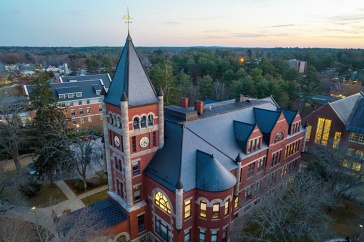Politics & Society major Meredith Howe spent an exciting fall semester in southeastern Europe through Peace and Conflict Studies in the Balkans, a journalism program offered by the School for International Training (SIT). Though based in Belgrade, Serbia, Howe had the opportunity to travel throughout the area—Kosovo, Bosnia and beyond— to soak in the sights and sounds of life in this post-conflict region.
Howe spent three weeks in Pristina, Kosovo, touted as Europe’s youngest capital by those who support Kosovo’s 2008 declaration of independence. After the breakup of Yugoslavia, Kosovo sought independence from Serbia, whose brutal response prompted a U.S.-led NATO military intervention in 1999 to prevent ethnic cleansing. Today, a three-meter statue of President Bill Clinton adorns a corner of the long boulevard that bears his name in gratitude for America’s intervention. But studying politics in Kosovo can be tricky business seeing that its status as a fully independent nation-state continues to be rejected by Serbia, of which it is still technically a part. Howe’s studies in the Politics & Society program, especially in courses on democratization and international relations, prepared her for journalistic work in post-conflict societies.
Howe chose to do her independent study project on the sensitive topic of gender equality and female representation in Kosovo’s parliament. She had the amazing opportunity to interview members of the Parliamentary Women’s Caucus to ascertain the personal and professional obstacles they face as well as their impact on policymaking.
Howe's article, titled "Kosovo's Female MPs Unite to Challenge Injustice," was published in the Balkan Insight online newspaper. An excerpt is below, and you can read the full article here.
When Shqipe Pantina, 42, a former civil society activist, decided to run for the Kosovo parliament as a member of the Vetevendosje (Self-Determination) opposition party, her family thought it was a joke.
She joined because, as an activist trying to bring about change in Kosovo, her options were limited if she remained outside the political sphere.
“I’d rather fight,” she said. She was elected to parliament in 2014.
Xhevahire Izmaku’s family wanted her to be a poet or a writer, not a politician. Her father hates politics and did not agree with her involvement, especially since she would be giving up her writing career. She is a now an MP with the ruling Democratic Party of Kosovo, PDK.
Izmaku said she wanted to get into parliament because before the 1998-99 war between Serbia and independence-seeking ethnic Albanians in Kosovo, politics was seen as men’s territory. “It was not normal for women to lead,” she said.
So Izmaku, 45, decided to try to change that.
















































